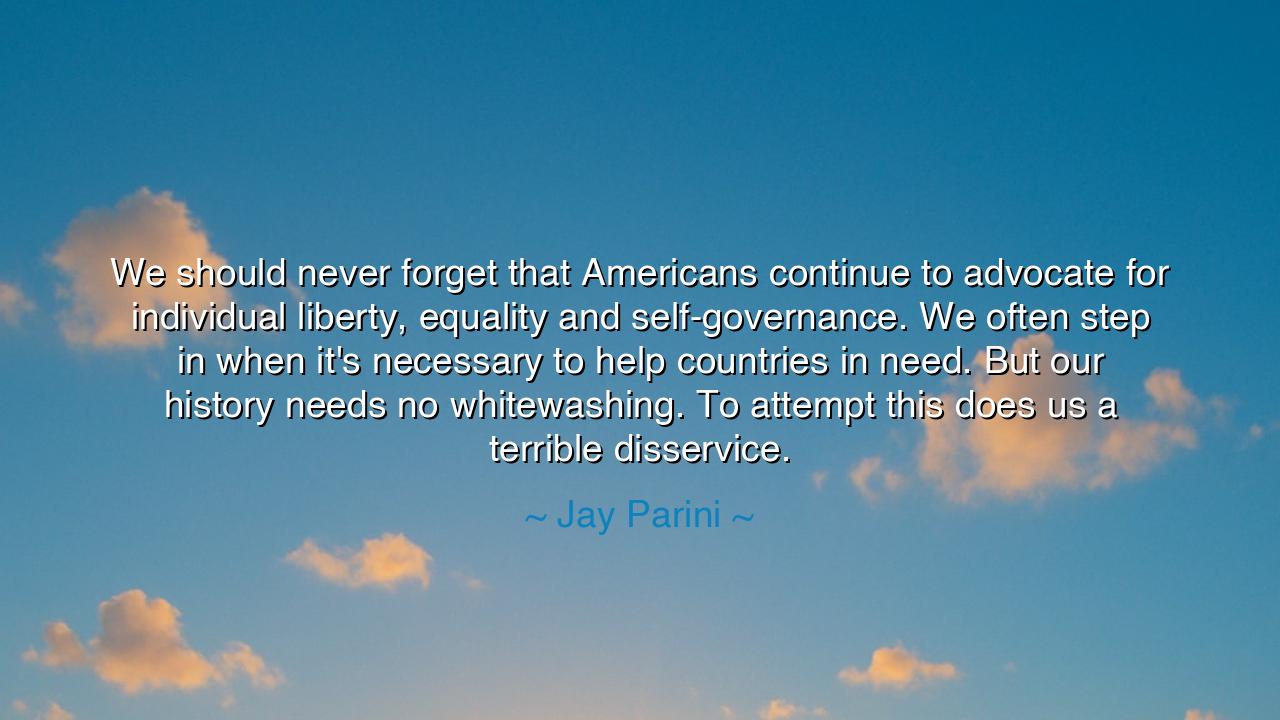
We should never forget that Americans continue to advocate for
We should never forget that Americans continue to advocate for individual liberty, equality and self-governance. We often step in when it's necessary to help countries in need. But our history needs no whitewashing. To attempt this does us a terrible disservice.






Hear now, O sons and daughters of memory, the words of Jay Parini, poet, historian, and keeper of truth, who declared: “We should never forget that Americans continue to advocate for individual liberty, equality, and self-governance. We often step in when it’s necessary to help countries in need. But our history needs no whitewashing. To attempt this does us a terrible disservice.” These words, though spoken in our own time, carry the gravity of ages. For they remind us that a nation, like a man, is defined not only by its virtues, but by its willingness to face its flaws with courage and humility.
Parini speaks as one who loves his country — not with blind devotion, but with honest affection, the kind that does not turn away from truth. To him, America stands as both beacon and paradox: a land founded upon the promise of liberty and equality, yet shadowed by the contradictions of its own making. Its people have long lifted high the banner of freedom — from the Declaration of Independence to the struggle for civil rights — and yet, too often, they have stumbled under the weight of injustice. Parini’s warning is this: to whitewash history is to erase not only our shame, but our strength; for it is through acknowledgment of failure that wisdom is born.
The ancients understood this truth well. In the temples of Athens, philosophers once taught that no man is truly wise until he knows his own ignorance. So too with nations. To confront one’s past — its triumphs and its crimes — is to grow in moral stature. But to hide it beneath the veil of pride is to remain a child, forever deceived by illusion. Parini calls his people to maturity, urging them to remember both the beauty and the burden of their story. For the greatness of a civilization does not lie in its perfection, but in its capacity to learn, to repent, and to rise again renewed.
Consider the tale of Abraham Lincoln, who, in the midst of civil war, spoke not only of victory but of redemption. He knew that liberty and equality could not exist while millions remained enslaved. And so, he steered his nation through fire and blood, that it might emerge cleansed and transformed. Yet Lincoln himself did not claim purity for America — he called instead for humility, for “malice toward none, and charity for all.” His vision was not of a sinless nation, but of a striving one — a people unafraid to face the truth of its own contradictions. This is the spirit that Parini invokes: the courage to love one’s country enough to see it clearly.
To whitewash history, Parini warns, is to wound the soul of a nation. For history is a mirror — it reflects not only what we wish to see, but what we must see. To paint over its cracks is to lose the chance to heal them. Think of those societies that have buried their crimes, that have silenced their dissenters, that have rewritten their pasts to appear flawless. Such nations may seem strong, but they are brittle, for they have built their house upon deceit. The United States, if it is to endure, must embrace truth as its foundation — truth in its triumphs, truth in its transgressions, truth in its ongoing struggle to live up to the ideals it proclaims.
There is in Parini’s words a deeper reverence — not for perfection, but for honesty. He reminds us that the story of America is not a straight line of virtue, but a winding road of progress and pain. Its people have known both slavery and emancipation, both prejudice and compassion, both conquest and mercy. To honor this history is to claim it whole — to celebrate the good without denying the evil. For only a nation that dares to look upon its own darkness can truly understand the light it carries.
And so, O listeners of conscience, take this teaching as your own: do not fear the truth of your past, whether it be personal or collective. To acknowledge imperfection is not to diminish yourself, but to strengthen your foundation. Speak the truth in love, and let remembrance be your guide. For when we forget, we repeat; but when we remember, we rise. Each generation must choose — to varnish the past with false glory, or to confront it with open eyes and open hearts. Choose truth, for it alone leads to freedom.
Therefore, let the words of Jay Parini stand as a torch for all who walk the path of history: a nation that forgets its sins loses its soul, but a nation that remembers them redeems it. Let Americans, and all peoples, continue to fight for liberty, equality, and self-governance — not as empty slogans, but as living promises renewed through truth. For only when we honor the full measure of our past — the noble and the painful alike — can we step forward into the future with integrity, with unity, and with light.






AAdministratorAdministrator
Welcome, honored guests. Please leave a comment, we will respond soon